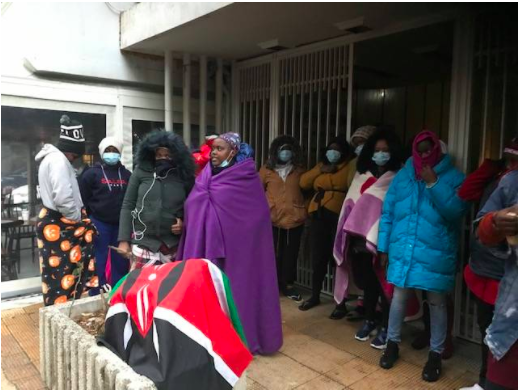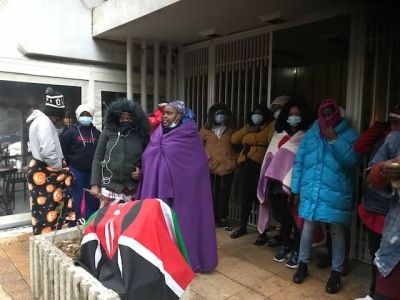
About 30 women camped for two weeks in front of Kenya's honorary consulate in Badaro. (Credit: Zeina Antonios/OLJ)
Three Kenyan domestic workers, who were among 30 women who had been squatting outside Kenya's honorary consulate in Badaro since early January, were finally able to go back to their home country last week.
L'Orient-Le Jour learned from the International Organization for Migration (IOM) that five more Kenyans will be making their long-awaited trip this week. The repatriation of these migrant workers is the outcome of multiple talks, which the IOM and several other NGOs held with Lebanese authorities and the honorary consulate of Kenya.
These women ended up on the street in this icy weather at the onset of the year, either because they fled abusive employers, or because they were simply abandoned by the families they came to Lebanon to work for, who could no longer afford to keep paying them due to the economic crisis. Some of them were even without passports, as their employers had seized their documents upon their arrival.
“Initially, 19 employees should have traveled back, but 14 of them tested positive for COVID-19. We had to delay their flights, but they will be repatriated once they are cured,” an authorized IOM source said. “Sixty-nine other Kenyan women contacted us, seeking to be repatriated. We are coordinating with the Lebanese and Kenyan authorities to decide how to assist them,” said the IOM source.
Moreover, the IOM revealed that a consular representative from the Kenyan Embassy in Kuwait (which also covers Lebanon, since Kenya does not have an embassy in Beirut) arrived in Lebanon last week to help Kenyans obtain the travel documents they do not have.
For its part, the Anti-Racism Movement (ARM), which works closely with Kenyan migrant women, revealed that those women still waiting were finally placed in an apartment, after they had slept in the rain for weeks.
“These women were finally housed in an apartment in Furn el-Shubbak, rented by Kuwait's consular envoy,” Farah Baba, advocacy and communications officer at ARM, said.
The honorary consul was not available to provide further information on the matter yesterday.
A unified contract soon?
Speaking to L'Orient-Le Jour, Claudine Aoun, president of the National Commission for Lebanese Women, who followed up on the Kenyan’s case and accompanied some of them to the airport last week, reiterated that some of them have pending judicial issues, which complicate their cases.
General Security did not respond to L'Orient-Le Jour’s questions on the Kenyan women.
Although the suffering of these domestic workers is seemingly being alleviated, their repatriation does not fix the many problems related to the kafala system, which entitles domestic workers to work in Lebanon only through a sponsor.
On this point, Aoun stressed that she is working on a unified contract for domestic workers. “The National Commission for Lebanese Women has met with the union of domestic workers recruitment agencies. Regarding the unified contract, we will submit our remarks to the Labor Ministry,” she said.
She also indicated that the kafala system remains “helpful, but is being poorly implemented.” “It is important to reform this system, for instance, in order to prevent any seizure of the female employees’ passports,” she underscored.
Nevertheless, the IOM called for the total abolition of the kafala system, which it denounces as “promoting abuse.”
“The kafala system heightens migrants’ vulnerability to abuse and exploitation, including human trafficking,” the IOM told L'Orient-Le Jour. “Policy and legislative reforms are necessary in order to curb the risk of exploitation among migrants, including the implementation of a unified contract, the abolition of the kafala system, the improvement of recruitment policies to prevent fraudulent practices and the inclusion of domestic workers in the labor law protections.”
The IOM also called for providing “migrants who have survived violence and exploitation with legal assistance, safe housing, medical and psychosocial assistance, assisted return and reintegration support.”
This article was originally published in French in L'Orient-Le Jour. Translation by Joelle El Khoury.
Note: This article was updated to clarify the wording of a quote from Farah Baba.
